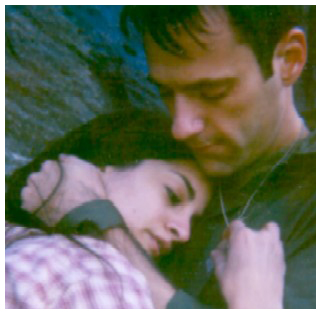Acclaimed SCREENPLAY Seeks PRODUCER
HOW HIS BRIDE CAME TO ABRAHAM
“When those who must not Love”
AMERICAN THEATRE WEB
CASUALTIES BEFORE WAR
by Andy Probst
AMERICAN THEATER WEB
April 4, 2003
“Two houses both alike in dignity” belonged to the grandparents of both Abraham, a young Israeli soldier, and Sabra, an even younger Palestinian woman, the characters at the center of How His Bride Came to Abraham, Karen Sunde’s, timely, gripping, and richly magical play that’s currently running at the Looking Glass Theatre, in a Praxis Theatre Project production. While Sunde’s play explores the conflict between Israel and Palestine, her work is also an engrossing look at how war can prematurely turn children into adults.
Sunde’s play begins when Abraham and his best friend set off a land mine while patrolling the Lebanese border. Wounded, Abraham crawls to safety in the mountains where he meets Sabra, a Christian Palestinian who has eluded the Israeli patrols. An uneasy truce between the two is called as Sabra takes Abraham into her “home” – a shelter that has been carved into the side of a cliff. As the two struggle in a cat-and-mouse game of suspicion and love, one begins to see that they are both just scared children, involved in their countries’ battle not because of any fierce sense of duty to the state or religious zealousness. Rather, Abraham and Sabra are simply trying to create homes – safe places – for their parents, all of whom were displaced when they themselves were children – Abraham’s during the Holocaust, and Sabra’s during Israeli-Palestinian conflict.
While one anticipates much of Sunde’s drama well before it happens (Abraham’s suspicions about poisoned food; the couple’s lovemaking), what one won’t anticipate is the emotional pull of her drama. One is relieved to find that “Abraham” does not contain mountains of political posturing. Sunde allows her characters to discuss the battles that rage around them, but it’s put in the context of parental loss and lost innocence. Sabra’s description of the murder of her younger siblings will haunt audiences well after the end of the play.
Along with the Sunde’s storytelling, one cannot anticipate the quiet power of the play’s two performers, Amir Babayoff and Maya Serhan. The fatigues that Babayoff wears and the dirt on his face don’t disguise the fact that this is just a young man, who’s really quite scared. The actor’s open face and bright darting eyes seem to beg for some kind of comfort, a sense of security that can’t be found in his Uzi or pistol. Serhan is equally haunted and haunting as a performer. Her soft features that can harden into almost stone tell the audience everything it needs to know about her will and her fears. Serhan’s performance is richly detailed, allowing the audience to see that Sabra is not only a fighter, but also a young woman who would like to be worrying about being pretty.
Director Courtney Patrick Mitchell’s staging of How His Bride Came to Abraham draws the audience into the play in unexpected ways. Scenes set outside of Sabra’s cave take place in between the rows of seating. When the two performers are in the cave, Mitchell’s direction allows for the graceful rise and fall of tension as the two navigate their tight environs, designed with simple realistic grace by Jenny B. Sawyers. Josh Bradford’s lighting design creates mood aptly while Darryl Gregory’s original score for woodwinds and percussion, performed by Sa-Reel Project, enhances the play’s other worldly qualities.
These qualities are most in evidence when Abraham hears his grandmother’s voice, and he wonders if Sabra is an angel that has been sent to protect him. When the couple realize that they are both virgins and talk about the biblical Abraham and their equally “promised” homes in Jerusalem, one also senses that forces beyond man might be at work.
Regardless of the outside forces that might be involved in Sunde’s story and the politics of the region, How His Bride Came to Abraham gives audiences a timely love story, one where two children must fight, to the death if necessary, to create a sense of home. If they can accomplish this, they will have given their parents some sense of security, and in doing so, restored some of the childhood innocence for this modern day Romeo and Juliet that has been lost well before the play began.
